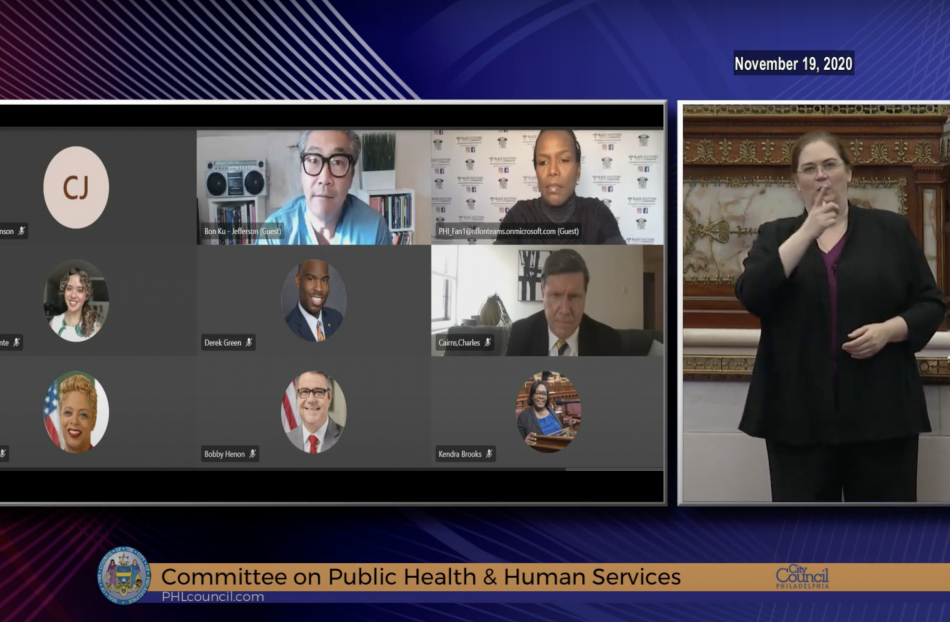
A City Council subcommittee held a public hearing on Nov. 19 to discuss resolutions related to the plan for distributing a COVID-19 vaccine in Philadelphia.
The Committee on Public Health and Human Services held a hearing regarding resolution 200520 which evaluates all of the City’s aspects of distributing the COVID-19 vaccine.
The hearing was held shortly after Pfizer and Moderna announced their successful COVID-19 vaccines. Doctors, policymakers, and infectious disease specialists discussed the process and timeline associated with the vaccine and offered recommendations for how it should be administered in Philadelphia.
The panel also addressed certain barriers to distribution, including cost and educating the public about the safety and efficacy of the vaccine, especially for communities who are negatively impacted by health disparities.
Dr. Bon Ku, emergency medicine physician at Jefferson Health, spoke passionately about the best way to distribute vaccines to the minority communities that were disproportionately affected by the COVID-19 outbreak.
“The vaccine distribution is going to be a logistical nightmare,” he said. “But I think it’s critical that we put the distribution sites in neighborhoods and that’s going to require community partners to develop trust with the public.”
The impacts of COVID-19 have been felt unequally across the city, with lower-income and predominantly Black neighborhoods hit hardest.
“There’s a moral imperative that we prioritize Black and brown communities because they have been disproportionately impacted by the pandemic,” Ku said.
The Philadelphia Department of Health is the lead agency in distributing the vaccine to residents. The plan defines critical populations, recruiting and training providers on vaccine use, storage, and handling models of vaccine distribution, data collection and reporting public information, and monitoring COVID-19 vaccinations for safety.
Dr. Caroline Johnson, deputy commissioner for the Philadelphia Department of Health, said that since vaccine availability is likely to be limited at first, the City has developed the below phased approach to distribute it to Philadelphia residents.
Researchers working on vaccines also spoke about the process of developing an effective treatment.
Dr. Richard Nettles, infectious disease physician representing Janssen pharmaceutical companies of Johnson and Johnson, explained how his company leveraged an adenovirus-based platform, which has been used to research other vaccines, like ones for HIV and Ebola.
The company will use that same platform to formulate the COVID-19 vaccine, he said.
According to Nettles, the company has signed a manufacturing agreement with the federal government to supply 100 million doses of the vaccine in 2021. He also used his confidence in the vaccine to assure those who may be skeptical about its efficiency.
“If the general population does not believe in the safety of the vaccines, they will not agree to take it,” Nettles said. “So we have signed a vaccine manufacturer’s pledge stating that we will not put forward the vaccine for approval by the FDA until we feel confident that we have achieved safety and efficacy.”
When discussing the potential cost of the vaccine, Johnson said there will be no cost to anyone in Philadelphia to receive this vaccine.
“Either for the vaccine itself, or for the administration charge, anyone who is to receive this vaccine has to sign an agreement with the City and with the CDC that says they will not charge the recipient of the vaccine any copays or any deductibles or any other kind of fee,” she said.
Health care providers are allowed to bill insurance companies, and the federal government has funding mechanisms for hospitals and doctors to provide vaccines to the uninsured, Johnson said.
“There is going to be no cost to anyone in Philadelphia to receive this vaccine,” she said.
The health department and researchers from Penn Medicine and Jefferson Health all said they are committed to delivering the vaccine safely and efficiently in Philadelphia.
“Philadelphia is not going to be treated any better or worse than any other jurisdiction,” Johnson said. “[The federal government and pharmaceutical companies] are going to do this on a straight per capita basis, so I think as a city we will be treated fairly. And that’s how vaccines have been handled historically.”
– Please email any questions or concerns about this story to: [email protected].



Be the first to comment